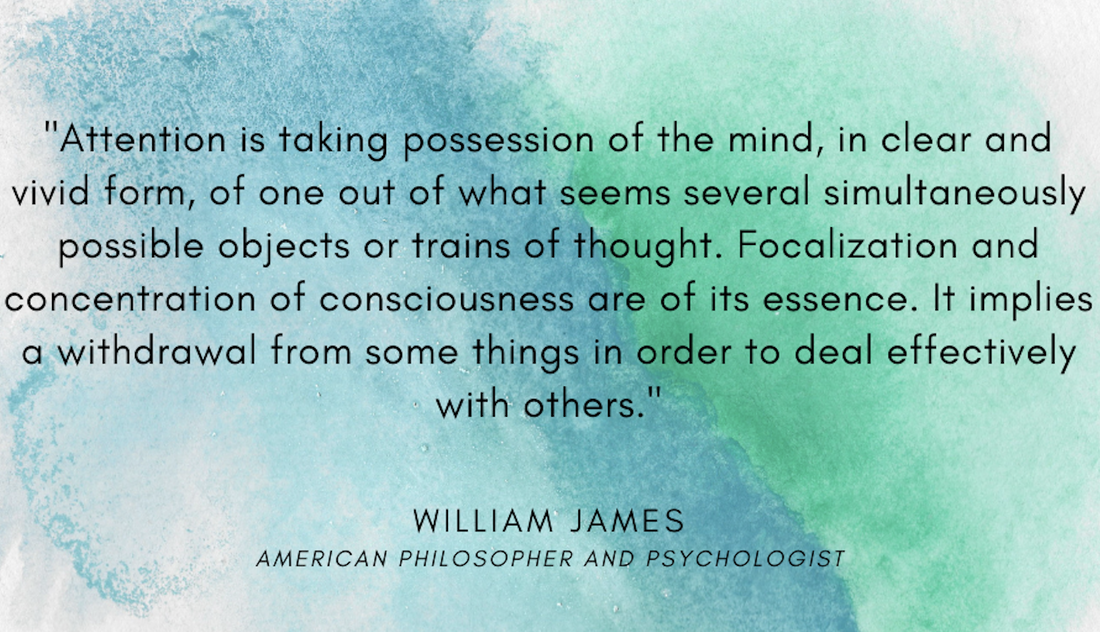|
In order to do great work, we must deepen our ability to focus exclusively on whatever it is we are doing. This seems so obvious, right?
As sensory overload shrivels our ability to direct available attention where it needs to be, one of the biggest challenges we face is to not only build the skill of focus, but to also improve our ability to ignore irrelevant stimuli. Neuroscience research indicates that ignoring irrelevant stimuli is a very active process taking place in the brain. And that it requires a lot of cognitive energy. The greater the distraction, the more cognitive energy required to ignore it. With increased cognitive energy being directed toward ignoring irrelevant stimuli, there is much less bandwidth to actually focus with clarity and precision on the task at hand. Bearing this in mind, it's not only about deepening our focus, but also about creating the conditions necessary to be able to ignore distractions. So, how might we learn to better ignore distractions? Declutter, declutter, declutter, and declutter! If you were to look at your own workspace, how organized is it? How easily can you reach for your headphones or grab your favorite pen? I'm certainly no expert at keeping my own space neat and tidy! I can vividly recall many times in the past, the impact that a cluttered working space had on my ability to be productive. For example, reaching for my headphones that are tucked on the shelf behind me. As I try to get them, I realize the chord is caught between a pile of papers, a magazine and an old coffee cup. As I try to pull the headphones toward me, everything goes crashing to the floor. In frustration, I untangle the chord and reach down to pick up the papers, magazine, and coffee cup. The result? Not only am I cursing myself, I'm also experiencing massive spikes in cortisol, adrenaline, and cognitive load. Not a great way to stay focused on the original task I was trying to do. The evidence is very clear on this. The more easily retrievable something is, the better. The more organized and efficient your space is, the less there is required to ignore. The brain, at a subconscious level, picks up everything around it. Meaning that the disorganization and clutter is very taxing on the brain. In order to perform at our best and be as productive as possible, it is worth our time and energy to redesign our workspace, declutter it, and have only the essentials on hand. Again, all of this seems so obvious, but the hardest part is to take consistent action to declutter. Decluttering physically is also an act of decluttering mentally. And as world renowned consultant and author Marie Kondo says: "The space in which we live and work should be for the person we are becoming now, not for the person we were in the past." I still have a way to go in my own life when it comes to decluttering, but in knowing how important it is, I'm definitely prioritizing it. What about you? Thanks for reading folks.
0 Comments
Leave a Reply. |
AuthorKAUST Faculty, Pedagogical Coach. Presenter & Workshop Leader.IB Educator. #RunYourLife podcast host. Archives
September 2022
|
- Welcome
- All Things Teaching and Learning
- The Aligned Leader Blog
- Consulting and Coaching Opportunities
- My TED X Talk
- My Leadership Blog
- Run Your Life Podcast Series
- How PYP PE with Andy Has Helped Others
- Good Teaching is L.I.F.E
- The Sportfolio
- Example Assessment Tasks
- PYP Attitude Posters (printable)
- Publications

 RSS Feed
RSS Feed
